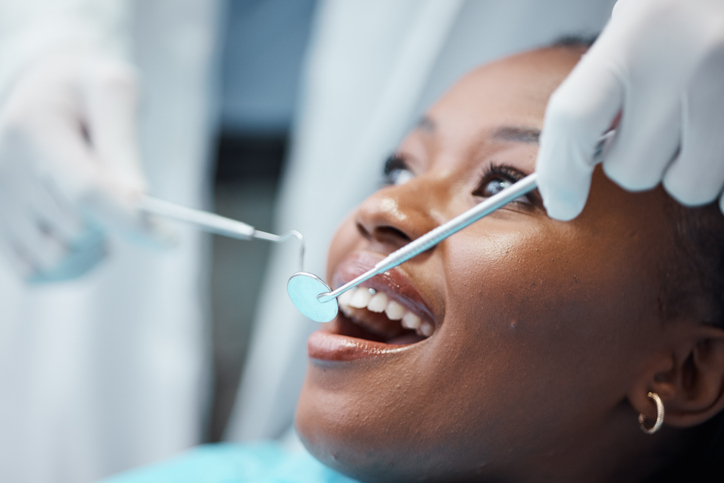Professional dental cleaning and consultation are essential parts of an effective preventative dentistry routine, which allows one to maintain good oral health and avoid expensive treatments. But how often should you undergo professional dental cleaning? Please read our article to learn important information about this procedure.
How Often Should You Undergo Professional Dental Cleaning?
Dentists recommend having a professional dental cleaning every six months or at least every 12 months. Often, even a comprehensive at-home oral hygiene routine is not enough to effectively remove all the food residue and plaque. This is especially true if the teeth are slanted or overcrowded. Even people who have perfectly aligned teeth still might experience difficulties with properly cleaning hard-to-reach areas on the back of the mouth.
If plaque is not removed regularly, it hardens and turns into tartar—a sticky substance that is impossible to remove at home. Plaque and tartar are filled with bacteria, which gradually destroy the teeth and gums, leading to cavities and periodontal disease. Thus, undergoing professional dental cleanings two times a year is essential if you want to prevent these issues.
What Happens During a Professional Dental Cleaning?
During a professional dental cleaning, your doctor will examine the condition of your teeth and gums. Then, plaque and tartar will be removed with special instruments, such as a scaler or an ultrasonic scaler, a professional floss, etc. The next step is brushing and polishing the teeth with a special brush and gritty toothpaste. Your dentist can also offer a fluoride treatment as a last step of the procedure.
Is a Professional Dental Cleaning Painful?
If there is significant tartar buildup on the teeth, especially in periodontal pockets or under a gum line, and the gums are irritated, professional dental cleaning may cause discomfort. However, if you undergo a dental cleaning regularly and your gums are healthy, there should be no pain or discomfort during the procedure. In cases of severe tartar accumulation or low pain tolerance and dental anxiety, your dentist might offer to use an anesthetic to make the cleaning more comfortable.
The Importance of Fluoride Treatment
Fluoride is highly beneficial for teeth’s enamel. It strengthens the enamel and makes it more resistant to bacteria and decay. Fluoride treatment done at a dental office has a higher concentration than over-the-counter solutions. It is recommended to have a fluoride treatment every six months to achieve optimal results and maintain teeth health for a long time.
It is ideal to have a fluoride treatment as the last step of professional dental cleaning. After cleaning, there is no plaque and food residue on the teeth, so the fluoride will penetrate the enamel more effectively.
How to Stay on Top of Your Oral Hygiene at Home
As previously mentioned, regular professional dental cleanings are necessary for the health of your teeth and gums. However, maintaining a thorough oral hygiene at home is equally important for preventing tooth decay and gum disease. To make your oral hygiene routine effective, follow these simple rules:
- Brush your teeth for two minutes twice a day with a soft toothbrush and fluoride toothpaste.
- In the evening, brush your teeth right before bed so nothing sits on your teeth overnight.
- In the mornings, consider brushing your teeth after breakfast so that food residue does not linger on your teeth.
- Try using a mono tuft brush in addition to a regular brush to clean each tooth more effectively.
- Floss every evening before brushing your teeth.
- Consider adding a water flosser to your hygiene routine. It should be used before using regular floss and brushing or in between these two steps. A water flosser is effective at loosening the food debris and plaque in hard-to-reach areas and along the gum line. It can also boost the effectiveness of your fluoride toothpaste.
- Do not use mouthwashes with alcohol or dye.
- Do not use abrasive toothpaste and toothbrushes to avoid damaging the enamel of your teeth and creating micro scratches on their surfaces.
- Rinse your mouth after meals.
- Never use your teeth as tools for opening bottles or biting off thread, etc., to prevent enamel damage, chips, and cracks.
Make an Appointment Today
Make an appointment for a checkup and a professional dental cleaning at a general dentistry office today. Specialists at My Dentist Anaheim offer high-quality dental services with up-to-date equipment and methods. We look forward to welcoming you and your family to our dental office.

